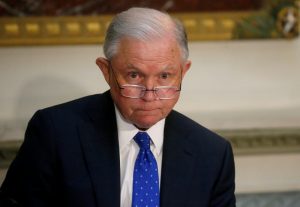
WASHINGTON (Reuters) – U.S. Attorney General Jeff Sessions on Thursday sought to speed up the deportation of illegal immigrants, telling immigration judges they should only postpone cases in removal proceedings “for good cause shown.”
Sessions, in an interim order that was criticized by some lawyers, said the “good-cause” standard “limits the discretion of immigration judges and prohibits them from granting continuances for any reason or no reason at all.”

U.S. Attorney General Jeff Sessions takes part in a Federal Commission on School Safety meeting at the White House in Washington, D.C., U.S., August 16, 2018. REUTERS/Leah Millis
Unlike the federal judiciary system, U.S. immigration courts fall under the Department of Justice and the attorney general can intervene. Sessions, a Republican former U.S. Senator appointed by President Donald Trump, has been unusually active in this practice compared to his predecessors.
Sessions has led efforts by the Trump administration to crack down on illegal immigration, including a “zero tolerance” policy that separated immigrant parents from their children while they were in U.S. detention. Trump abandoned the separation policy in June under political pressure.
Critical in showing “good cause” is whether a person is likely to succeed in efforts to remain in the United States, either by appealing for asylum or receiving some form of visa or work permit, Sessions said on Thursday.
Stephen Kang, an attorney with the ACLU immigrants rights project, described Sessions’ order as “troubling” and one of a series that “has moved in the direction of restricting due process rights for individuals who are in removal proceedings.”
Kang said Sessions seemed to portray immigrants seeking more time to prepare their cases as trying to “game the system and avoid deportation.”
Kang said removal proceedings were complex and people needed time “both to get lawyers to ensure that their due process rights are protected and time just to make sure their cases get a fair hearing.”
The Justice Department has been struggling to reduce a backlog of deportation cases. An analysis by the Government Accountability Office last year found the number of cases that drag on from one year to the next more than doubled between 2006 and 2015, mainly because fewer cases are completed per year.
Department spokesman Devin O’Malley said more immigration judges had been hired, but “unnecessary and improper continuances … continue to plague the immigration court system and contribute to the backlog.”
Sessions said on Thursday that the “use of continuances as a dilatory tactic is particularly pernicious in the immigration context” because people in the country illegally who want to remain have an incentive to delay their deportation as long as possible.
Granting continuances solely for good cause would be an “important check on immigration judges’ authority” and demonstrate public interest in “expeditious enforcement of the immigration laws,” Sessions said.
(Reporting by David Alexander; editing by Leslie Adler and Grant McCool)







